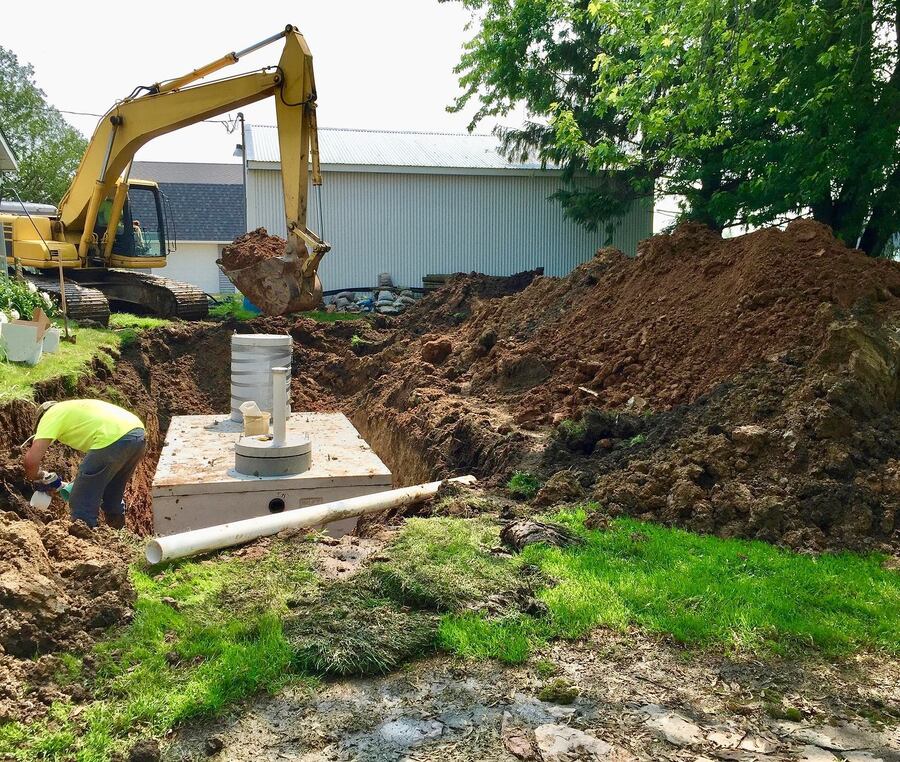WE NOT ONLY PUMP YOUR TANK - WE CLEAN IT! Free Septic System Inspection ($99 Value) Free enzyme treatment , Financing Available
Call Septic Blue Now 813-355-9188
It's Easier Schedule Online
WE NOT ONLY PUMP YOUR TANK - WE CLEAN IT! Free Septic System Inspection ($99 Value) Free enzyme treatment , Financing Available
Call Septic Blue Now 813-355-9188
It's Easier Schedule Online

Septic tanks are a critical part of many homes’ wastewater management systems, designed to treat and dispose of wastewater safely. Homeowners can make informed decisions that align with their property and maintenance requirements by comprehending the material alternatives available for septic tank installation. Each material has unique characteristics that affect durability, cost, and maintenance requirements.
In this blog post, our professionals from Septic Blue will explore the most common materials used for septic tanks and their benefits and drawbacks.
Concrete is a highly sought-after material for septic tanks due to its durability and extended lifespan. These tanks are heavy, reducing the risk of shifting or floating, which can occur in areas with high groundwater. Concrete tanks typically last for decades if properly maintained with regular septic tank pumping and inspections.
However, they are not without drawbacks. Poor-quality concrete or improper installation can lead to cracks, which may cause leaks or structural issues over time. It is imperative to conduct routine septic cleaning and timely septic tank repair to guarantee the longevity of concrete tanks.
Plastic septic tanks are a lightweight and cost-effective option. Their low weight renders them more cost-effective and convenient to install and transport, particularly in regions with restricted accessibility. Plastic containers are also highly resistant to rust and corrosion, which guarantees their longevity when maintained properly.
In certain circumstances, their lightweight nature can be a disadvantage. Plastic containers are more susceptible to shifting or floating in high-water-table regions, particularly when they are not properly anchored. Additionally, they may be less durable than concrete, requiring more frequent monitoring by a reliable septic company to avoid structural damage.
The holidays are all about good food, family visits, and…
Read More+When it rains a lot, your yard might flood, the…
Read More+When you live in a home with a septic system,…
Read More+Fiberglass tanks are similar to plastic tanks in many ways but are generally stronger and more resistant to cracking. Lightweight, rustproof, and resistant to chemical damage, they are an exceptional option for regions with corrosive soils or challenging environmental conditions.
These tanks require less maintenance than some other materials, but regular septic tank cleaning and pumping are still necessary to keep them functioning efficiently. Like plastic tanks, they can shift if the soil conditions aren’t ideal, so proper installation is crucial.
Steel tanks were once a popular choice; however, their susceptibility to corrosion and rust has diminished their appeal. Although they are initially robust and resilient, they have a limited lifespan than other materials. Homeowners with steel tanks often face higher repair costs as corrosion can lead to leaks or even complete tank failure.
It is imperative to collaborate with a septic firm for routine inspections and maintenance if your property is equipped with a steel septic tank. Prompt septic tank repair can help extend the life of a steel tank, but replacement may eventually become necessary.
Aerated septic tanks, which are frequently constructed from fiberglass or plastic, are intended to enhance the efficiency of effluent treatment by incorporating oxygen into the treatment process. While not a distinct material type, aerated tanks are worth mentioning as their advanced systems require specific maintenance.
These tanks can break down waste more quickly, reducing the frequency of septic tank pumping. However, their mechanical components require regular servicing, which may add to maintenance costs.
Are you in need of a septic tank repair? Luckily, we at Septic Blue have dedicated workers ready at your service. Contact our representatives for more questions.